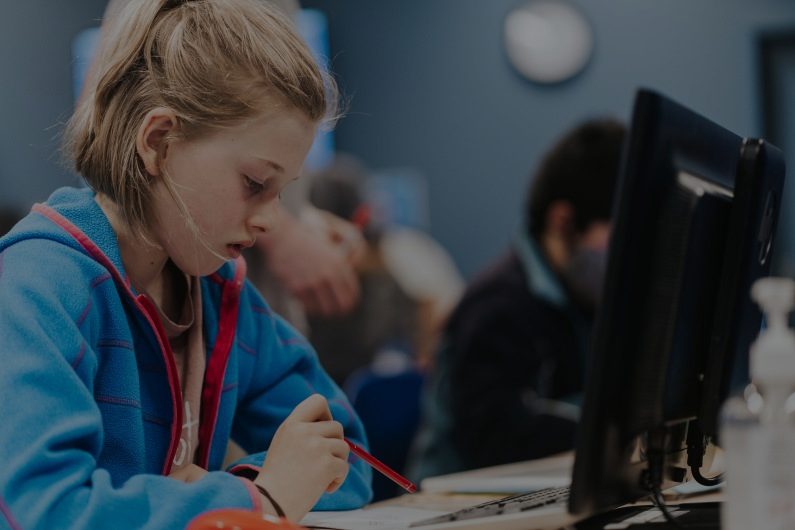4 Steps to a Positive Parent-Teacher Relationship

The partnership between parents and teachers is not just essential; it's transformative. Open and honest communication forms the bedrock of strong parent-teacher relationships. Engaging in respectful and transparent conversations creates a nurturing atmosphere where ideas and concerns can be freely shared.
In this blog we dive into the crucial steps that pave the way for a positive parent-teacher relationship, ensuring that the educational journey of your child is marked by collaboration, support, and shared goals.
Is your child struggling to keep up with schoolwork? Are they falling behind? Are they bored in class? Or are you looking for extension work for your child? Check out our eBook to learn more about how we help your child improve academically and build confidence through our in-centre after-school tuition.
Understanding Each Other’s Roles
A clear understanding of the roles parents and teachers play in schools is crucial. Recognising each other’s skills and expertise not only builds relationships but also nurtures mutual respect.
When parents actively engage in their child's learning journey by supporting classroom activities and reinforcing lessons at home, it creates a harmonious and unified approach to their child's education, enhancing the overall learning experience.
Accept, Help, Ask, and Listen
Parent-teacher meetings serve as invaluable portals into the intricate world of a child's education, transcending report cards and assignments to reveal a rich tapestry of progress and challenges. The very essence of these meetings lies in the multifaceted concept of acceptance.
To "Accept" means more than just showing up—it involves arriving with a genuine curiosity and a willingness to comprehend the nuances of a child's academic life. When parents approach these meetings with enthusiasm and gratitude, they embark on a journey to gain profound insights into their child's daily experiences at school.
Once present in these meetings, the role of parents transforms into that of active collaborators. "Help" signifies not merely absorbing information but actively engaging with teachers. It’s about sharing the wealth of knowledge parents possess regarding your child's unique learning styles, family dynamics, and personal challenges. By openly communicating these nuances, parents provide teachers with essential puzzle pieces, enabling them to tailor their teaching methods to suit the child’s individual needs.
The power of "Ask" is transformative. It goes beyond mere enquiries about grades; it delves into the social intricacies of the classroom and the emotional challenges a child might be facing. By posing thoughtful questions, parents demonstrate a genuine interest in the holistic development of their child. This curiosity opens up avenues for teachers to share comprehensive insights, painting a vivid picture of the child’s overall school experience.
Yet, amidst the dialogue, the most crucial role parents play is that of the empathetic listener. Actively engaging in the art of "Listening," parents absorb the teacher’s observations, concerns, and suggestions. This deep level of understanding fosters trust and effective communication, paving the way for collaborative efforts between home and school.
Proactive listening ensures that parents comprehend not only the achievements but also the areas of improvement highlighted by teachers, enabling them to extend the supportive atmosphere into the child's home environment.
This seamless collaboration and understanding not only enhance a child’s educational journey but also nurture a profound partnership between teachers and parents. It creates a harmonious blend of insights, efforts, and support, ensuring that your child receives the tailored guidance they require to flourish academically, emotionally, and socially.
Setting Realistic Expectations
Engaging collaboratively in homework assignments and establishing realistic, tailored goals for a child’s abilities are fundamental elements in cultivating positive relationships among children, teachers, and parents. These practices act as foundational pillars, nurturing academic growth and creating a supportive learning environment.
In this specific case, Mrs Johnson, Emily’s teacher, collaborates closely with her parents, Mr and Mrs Anderson, to set achievable homework objectives that align with Emily’s strengths and challenges. By dedicating 30 minutes each evening to focused homework tasks, they ensure a structured approach to her studies.
Within the Anderson household, a supportive atmosphere is meticulously crafted. Mr and Mrs Anderson provide unwavering encouragement and guidance during Emily’s study sessions, fostering an environment where learning becomes an enjoyable endeavour. Mrs. Johnson supplements this effort by providing additional resources and educational games, enriching Emily’s learning experience comprehensively.
This collaborative approach not only cultivates a positive attitude towards homework but also empowers Emily. Through this synergy of understanding and support, the teacher-parent partnership acts as a guiding force in Emily’s educational journey.
By fostering an environment of balanced expectations, where consistent encouragement and support emanate from both home and school, Emily is not only thriving academically but also developing a lifelong passion for learning. This partnership exemplifies the transformative power of collaborative efforts, creating a nurturing space where a child's potential can truly flourish.
Empathy and Understanding
Empathy serves as the cornerstone for building connections and fostering understanding across diverse perspectives. Taking the time to comprehend the challenges faced by teachers, children, and parents not only cultivates unity but also nurtures robust relationships.
When individuals put themselves in each other's shoes, it nurtures mutual understanding and support, especially during challenging moments in the school journey. This empathetic approach fosters a sense of compassion, creating a supportive environment that strengthens overall understanding and cooperation within the school community.
Building Trust and Mutual Respect
Trust blossoms through consistency in actions. Appreciating the diverse backgrounds, skills, and unique qualities of teachers nurtures a profound sense of mutual respect within the educational community.
By safeguarding confidentiality and embracing acceptance, a safe space for open dialogue is forged. This environment fortifies the connections among parents, teachers, and children, establishing a foundation of trust and understanding essential for effective collaboration in the educational journey.
Fostering a Positive Learning Environment at Home and School
Education transcends classroom boundaries. Cultivating a supportive learning environment at home, fostering positive attitudes and behaviours in school, and instilling a love for learning in children. By nurturing this enthusiasm for knowledge, parents, children, schools, and teachers collaborate to inspire a lifelong passion for learning.
Through embracing effective communication, understanding roles, practising empathy, setting shared goals, building trust, involving parents in school activities, resolving conflicts, and fostering a positive learning atmosphere, a robust parent-teacher relationship flourishes. These steps are more than just a framework; they serve as the cornerstone for a brighter future for our families, schools, and children.
Let us commit to these principles, for by doing so, we pave the way toward a future where your child thrives academically, emotionally, and socially within supportive family structures.
Together, we construct enduring bridges, shaping generations of successful children and fostering environments where children can flourish and families can thrive.
Our after-school maths and English tutoring programs are designed to inspire children to achieve their learning goals while providing them with the necessary support to succeed.
Our individualised tutoring approach can help develop children's skills and abilities. To learn more about our programmes and how we can support your child's academic needs, reach out to us by contacting your local centre or booking a free assessment today.



